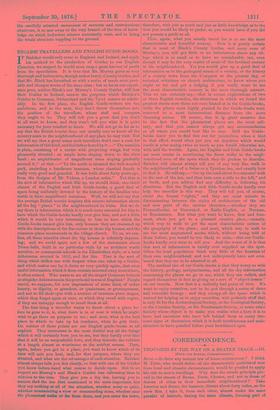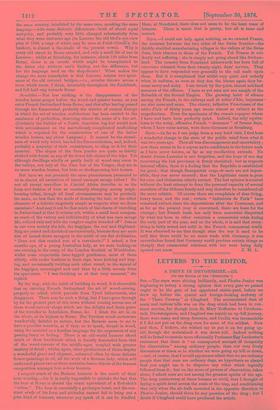CORRESPONDENCE.
THOUGHTS BY THE WAY ON A BEATEN TRACK.—III. mum OUR SPROUL CORRESPONDENT.] Berne.—Is there any natural law of house-architecture ? I think M. Taine, who would derive all the characteristic qualities of men from local and climatic circumstances, would be puzzled to apply his rule to men's dwellings. Why does the arcade principle pre- vail in the streets of Berne, Turin, Chester, and not in those of dozens of cities in their immediate neighbourhood ? Take Lucerne and Berne, for instance, distant about forty miles, as the crow flies, 1 take it, from each other, almost under the same parallel of latitude, haying the same climate, forming part of
the same country, inhabited by the same race, speaking the same language—with some dialectic differences—both of about equal antiquity, and probably very little changed substantially from what they were centuries ago (in Lucerne the old bird's-eye.view plan of 1598, a copy of which may be seen at Falck-Givelli's, the bankers, is almost a fac-simile of the present town). Why is every old street in Berne arcaded, and only a small bit of one in Lucerne ; whilst at Strasburg, for instance, about 120 miles from Berne, there is an arcade which might be transplanted to the latter city without one's finding out the difference, but for the language used on the shop-fronts? What makes the change the more remarkable is that Lucerne retains two speci- mens of the old covered bridges,—i.e., arcades thrown across a river, which recur, I think, invariably throughout the Entlebuch, and full half-way towards Berne.
Neuchatel.—Not less striking is the disappearance of the wooden house proper before the wood-and-plaster house, as you enter French Switzerland from Berne, and that after having passed through the Emmenthal, probably the district of central Europe in which the art of wooden architecture has been carried to the maximum of perfection, deserving almost the name of a fine art. (Certainly the builder of a North American log-hut would look with astonishment on the marvellously complicated scaffolding which is required for the construction of one of the better wooden houses, say about Langnau.) It cannot be the abund- ance of wood only which has led the Emementhalers, and, indeed, probably a majority of their countrymen, to cling to it for their material. The slopes of the Jura yonder are quite as thickly clothed with forest as any of the lower hill-chains of the Alps. Yet although dwellings wholly or partly built of wood may recur in the valleys, not only of the Jura but of the Vosges, they are in no sense wooden houses, but huts or sheds growing into houses.
But have we not precisely the same phenomenon presented to us in almost all narratives of travel amongst savage tribes ? Do not all recent travellers in Central Africa describe to us the form and fashion of huts as constantly changing among neigh- bouring tribes, though all local circumstances may be precisely the same, no less than the mode of dressing the hair, or the other elements of a toilette singularly simple as respects what we deem essentials ? And may it not be that much of the charm of travelling in Switzerland is that it retains yet, within a small local compass, so much of the variety and individuality of what was once savage life, refined only and with the rougher angles rounded off ? Just as in our own society the kilt, the bagpipes, the reel and Highland- fling are prized and cherished unconsciously, because they are mere bits of tamed-down savagery in the midst of our flat civilisation. "Does not this remind you of a corroborie?" I asked, a few months ago, of a young Australian lady, as we were looking-on one evening in the camp of the London Scottish at Wimbledon, whilst some respectable bare-legged gentlemen, most of them elderly, with cocks' feathers in their caps, were kicking and leap- ing, and occasionally twirling each other round, to the squeal of the bagpipes, encouraged now and then by a little scream from the spectators. "I was thinking so at that very moment," she replied.
By the way, with the habit of building in wood, it is observable that on entering French Switzerland the art of wood-carving, properly so called, which prevails from Tyrol hitherwards, also disappears. There may be such a thing, but I have gone through by far the greater part of this town without coming across one of those wood-carvers' shops which are the delight and drain-purse of the traveller in Interlaken, Berne, &c. I think the art is, on the whole, at its highest in Berne. The Tyrolese wood-carvers are wonderfully faithful to nature, but the Bernese seem to me to have a peculiar maestria, as if they, so to speak, thought in wood, using the material as a familiar language for the expression of any passing fancy or feeling. There is an old-world humour about much of their handiwork which is lineally descended from that of the wood-carvers of the middle-ages, coupled with greater mastery of detail ; whilst, again, other productions of theirs display a wonderful grace and elegance, enhanced often by those delicate flower-paintings in oil, all the work of a Bernese lady, which will make such pieces two or three centuries hence objects of the keenest competition amongst bric-a-brac hunters.
I suspect much of the Bernese humour is the result of their bear-worship,—for it is really impossible to mistake the fact that the bear at Berne is almost the exact equivalent of a Red-skin's "totem." The bear is essentially a grotesque beast, and the con- stant study of his form and attitudes cannot fail to bring out a grim kind of humour, wherever any spark of it can be kindled. Here, at Neuchatel, there does not seem to be the least trace of humour. There is much that is pretty, but all is tame and correct.
Dijon.—I could not help again noticing, as we entered France, the contrast between the two sides of the Swiss frontier—the thickly-studded manufacturing villages in the valleys of the Swiss Jura, their absence in those of the French. Yet France is evi- dently not suffering ; she is simply not going ahead like Switzer- land. The country from Neuchatel hitherwards has been full of reseroistes released from their twenty-eight days' service. They appear to have responded very generally to the call made upon them. But it is complained that whilst very quiet and orderly when in uniform, as soon as they don the blouse again they be- come saucy and noisy. I am struck by the quiet, almost subdued manners of the officers. I have as yet seen not one sample of the Bobadils of the Second Empire. The growing habit of silence among the French, in the railways and at tables d'hôte, impresses • me also more and more. The cheery, talkative Frenchman of the tables d'hôte of thirty years ago seems almost as extinct as the megatherium. Even the specimens of the commis voyageur whom I have met have been perfectly quiet. Indeed, the only equiva- lents to the noisy, offensive French " drummer " of former days, whom I have come across, were three Germans at Strasburg.
P.aris.—As far as I can judge from a very brief visit, I find here a wonderful change in the state of the public mind from what it was two years ago. Then all was discouragement and uncertainty ; now there seems to be a repose anda confidence in the future such as I have never known, as far as my recollection extends. No doubt Alsace-Lorraine is not forgotten, and the hope of one day recovering the lost provinces is firmly cherished ; but as respects internal affairs, there is a feeling that the Republic is established for good ; that though Bonapartist coups-de-main are not impos- sible, they can never succeed ; that the Legitimist cause is gone for ever, and Orleanism utterly extinct. The last opinion is averred without the least attempt to deny the personal capacity of several members of the Orleans family and may therefore be considered all the more reliable. Of course there are complaints of dear living, heavy taxes, and the rest ; certain "industries de Paris" have remained extinct since the deportations after the Commune, and as far as the present year is concerned, there are fears for the vintage ; but French trade has only been somewhat disquieted by what has been in other countries a commercial crisis during the early part of the year, and on the whole, it is said that every- thing is fairly sound and solid in the French commercial world. It was observed to me that though after the war it used to be said that there could be no more trade with Germany, it was nevertheless found that Germany could produce certain things so cheaply that commercial relations with her were being daily



































 Previous page
Previous page